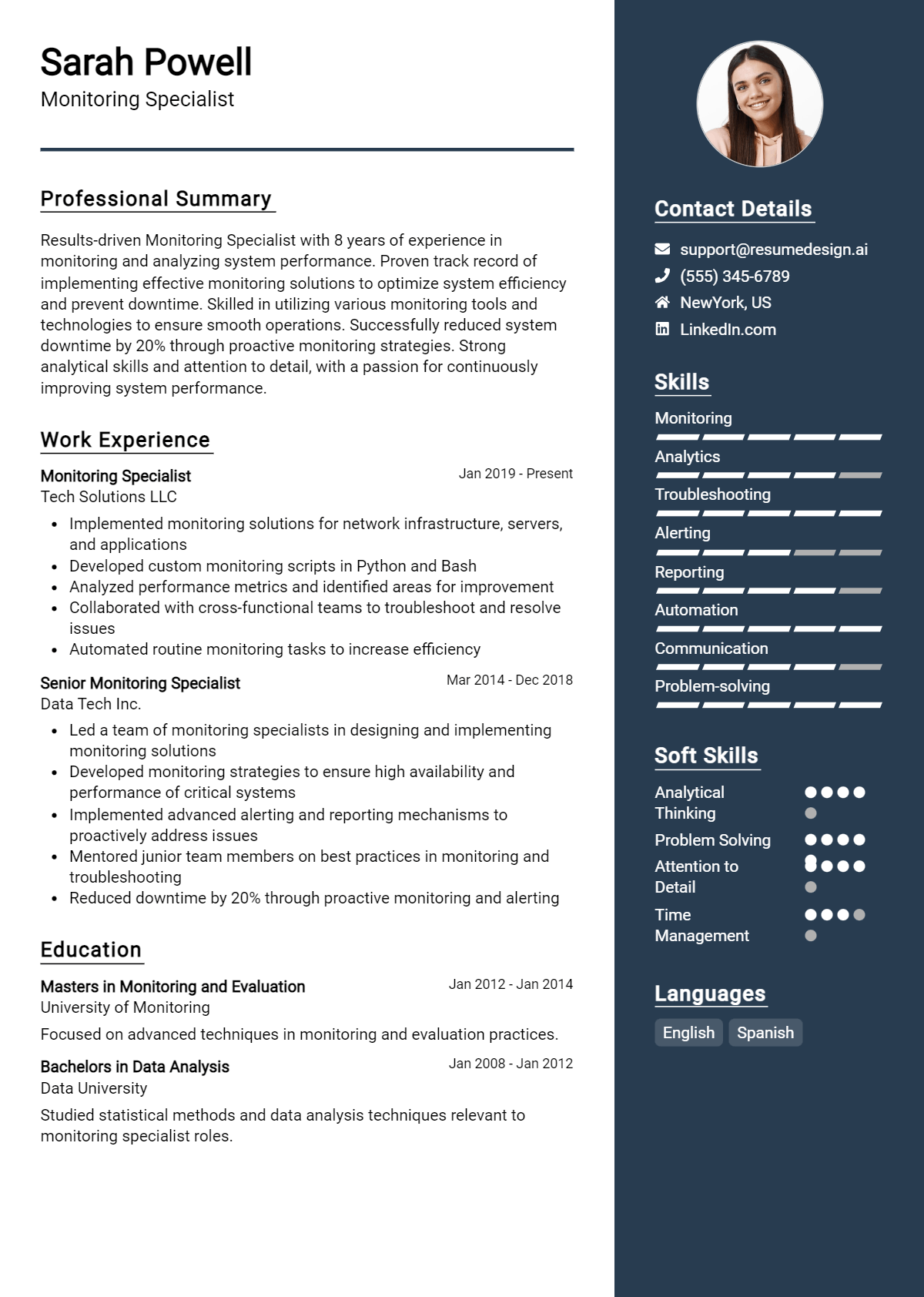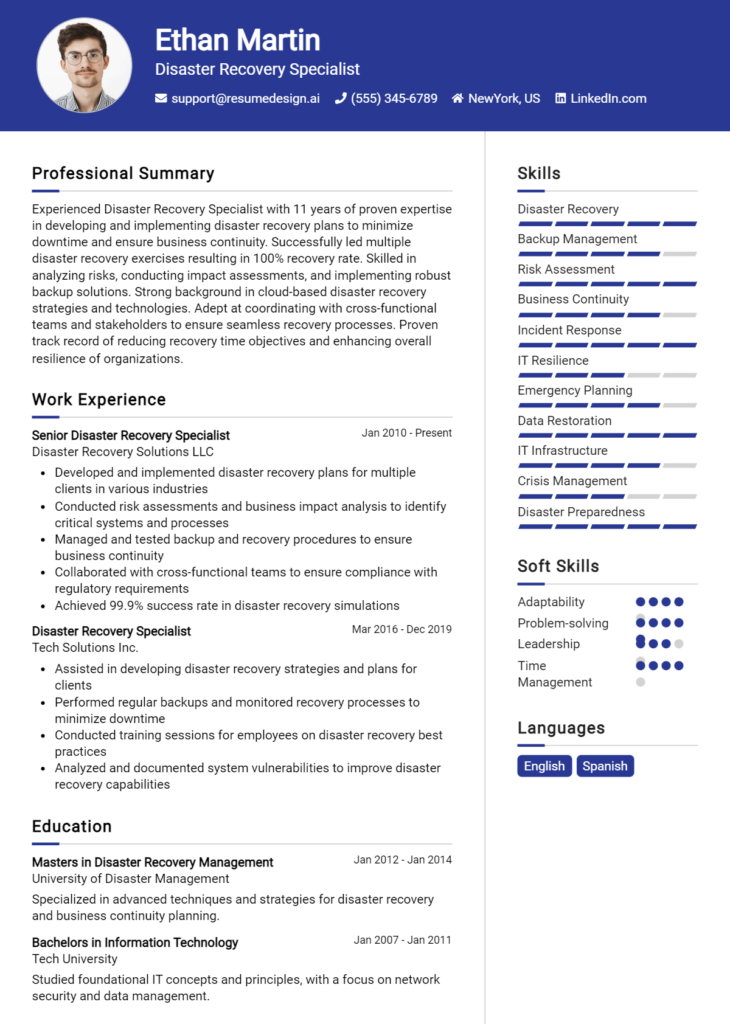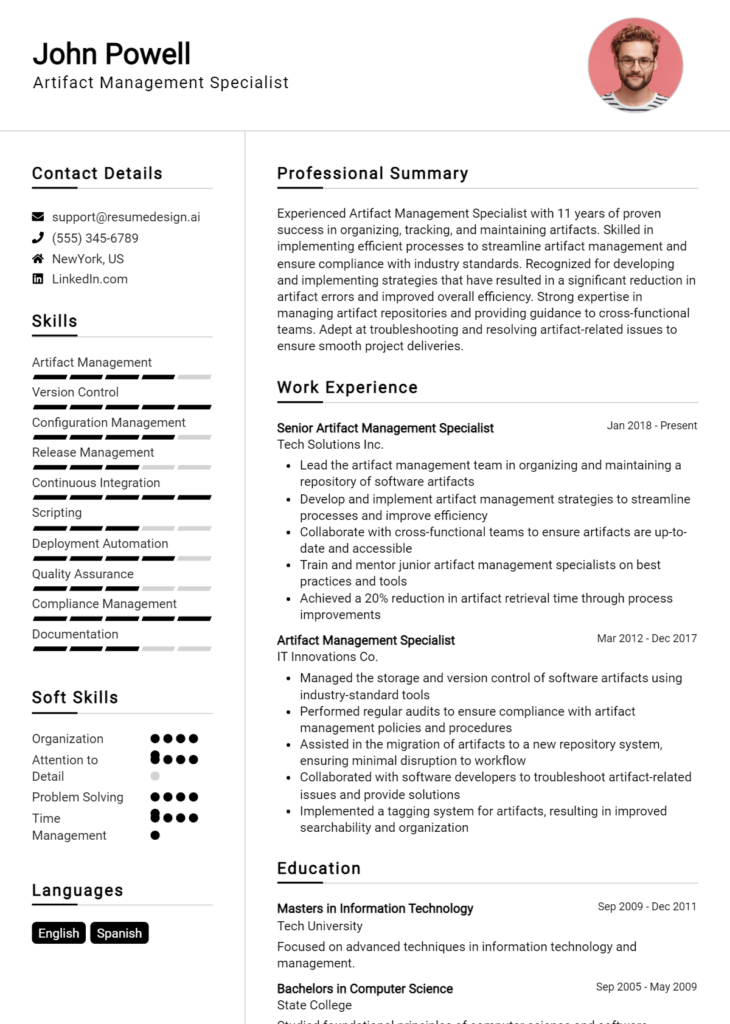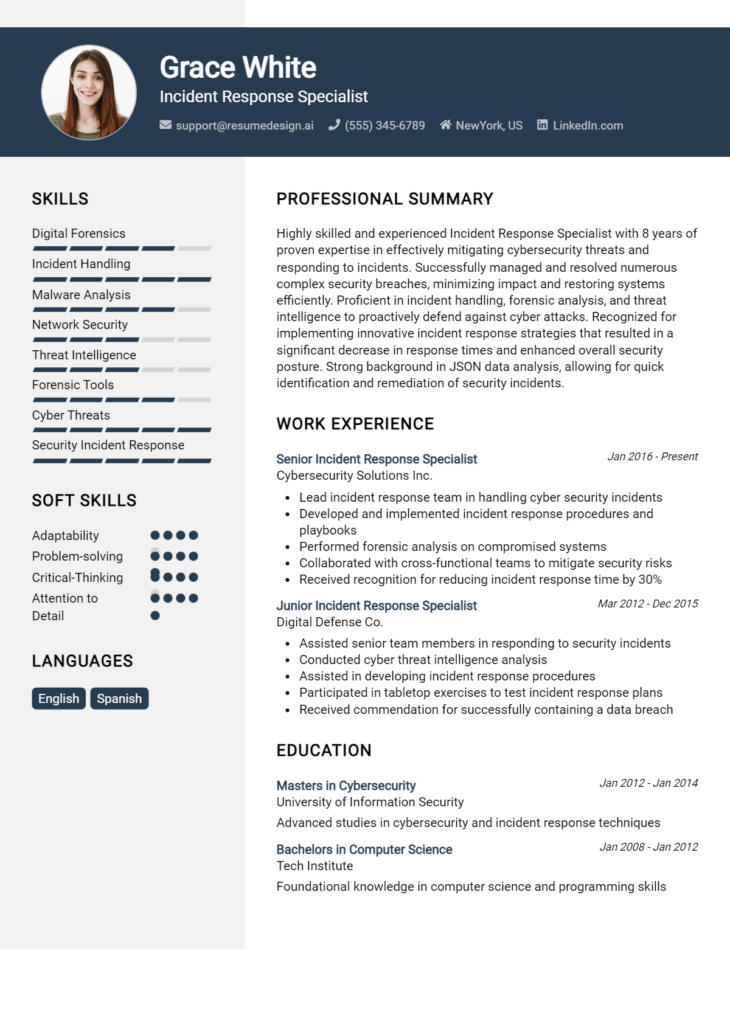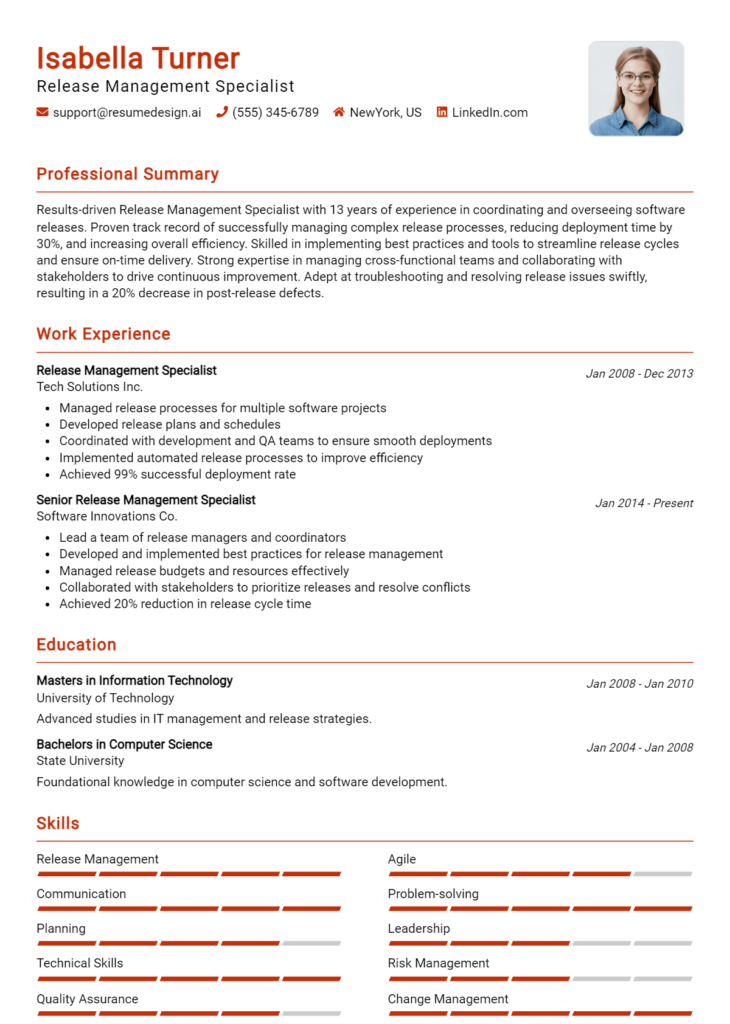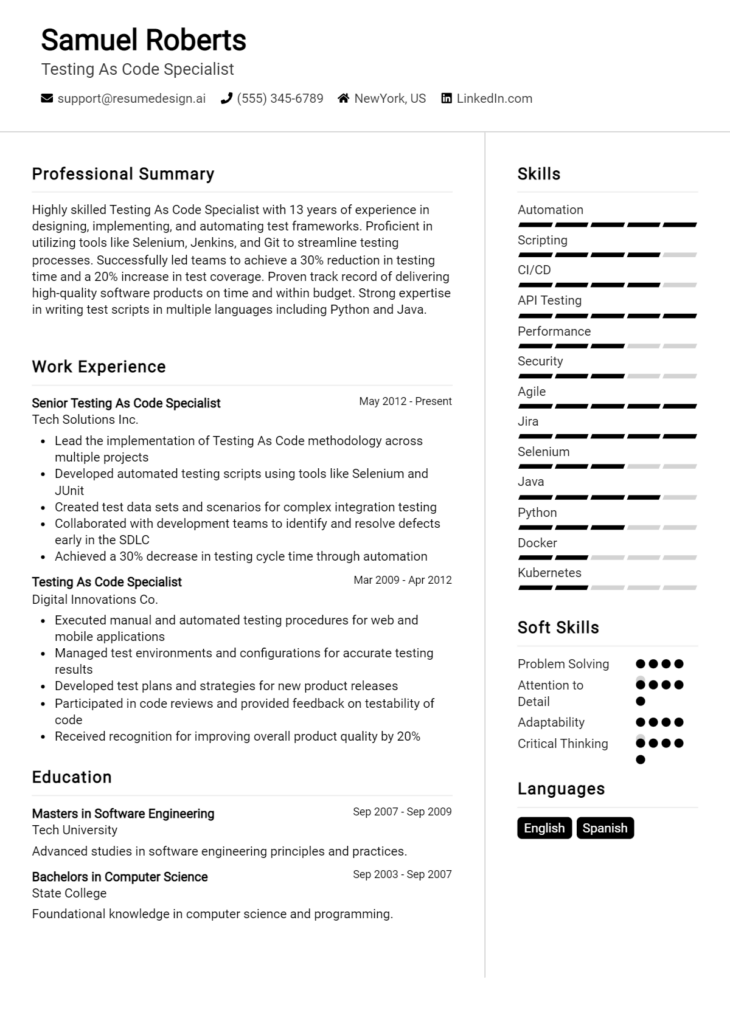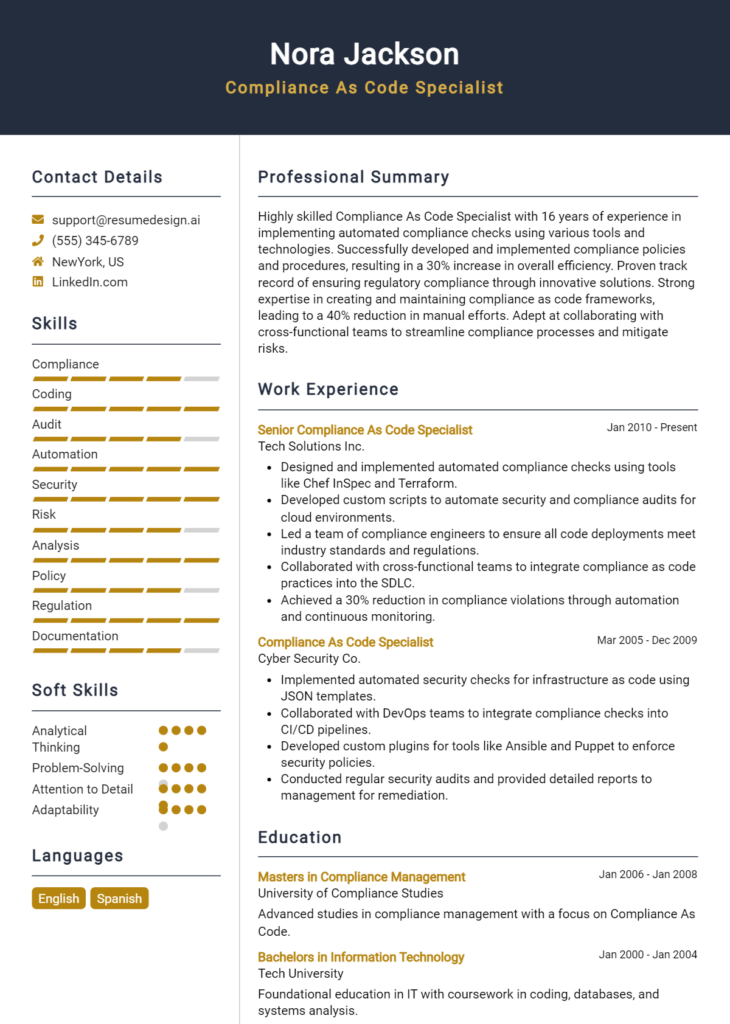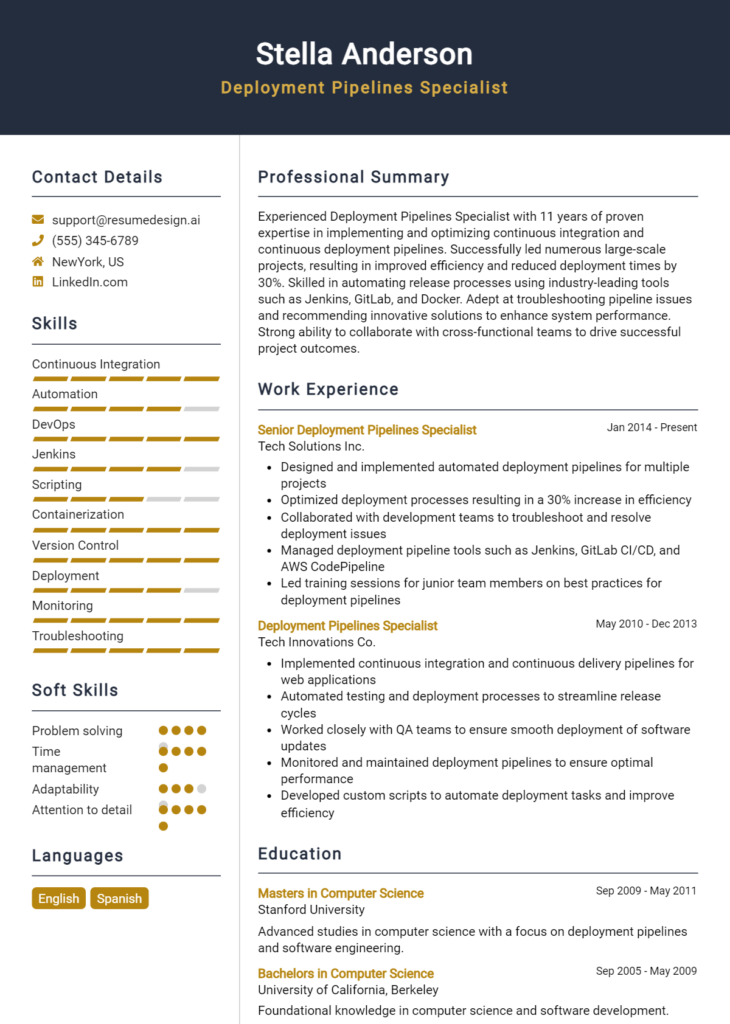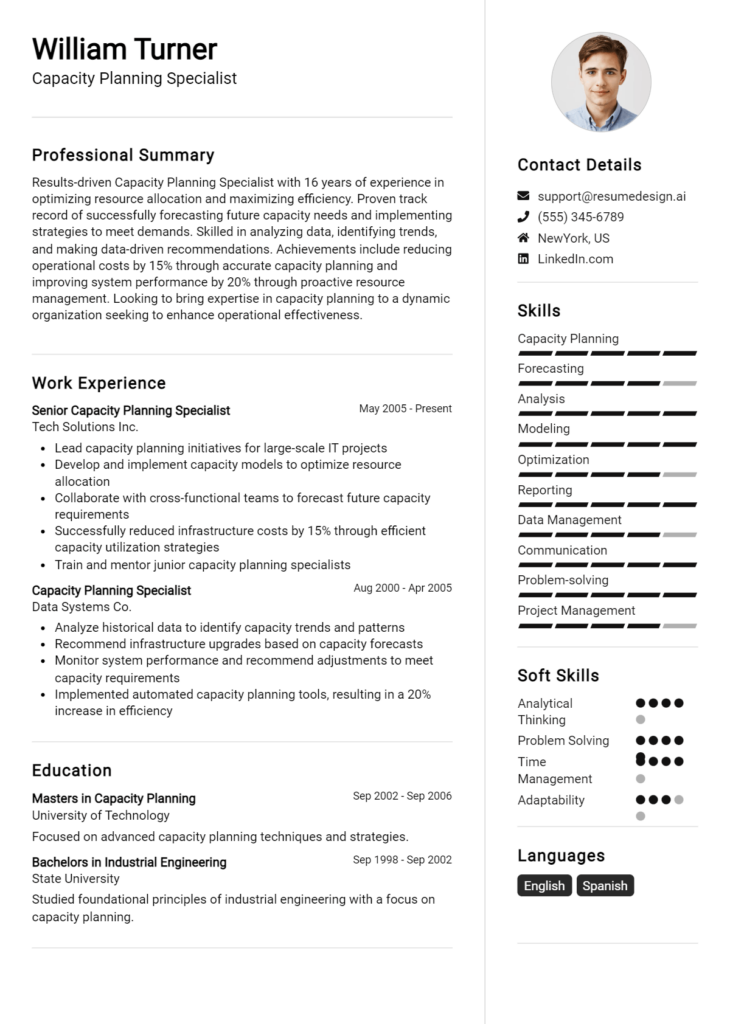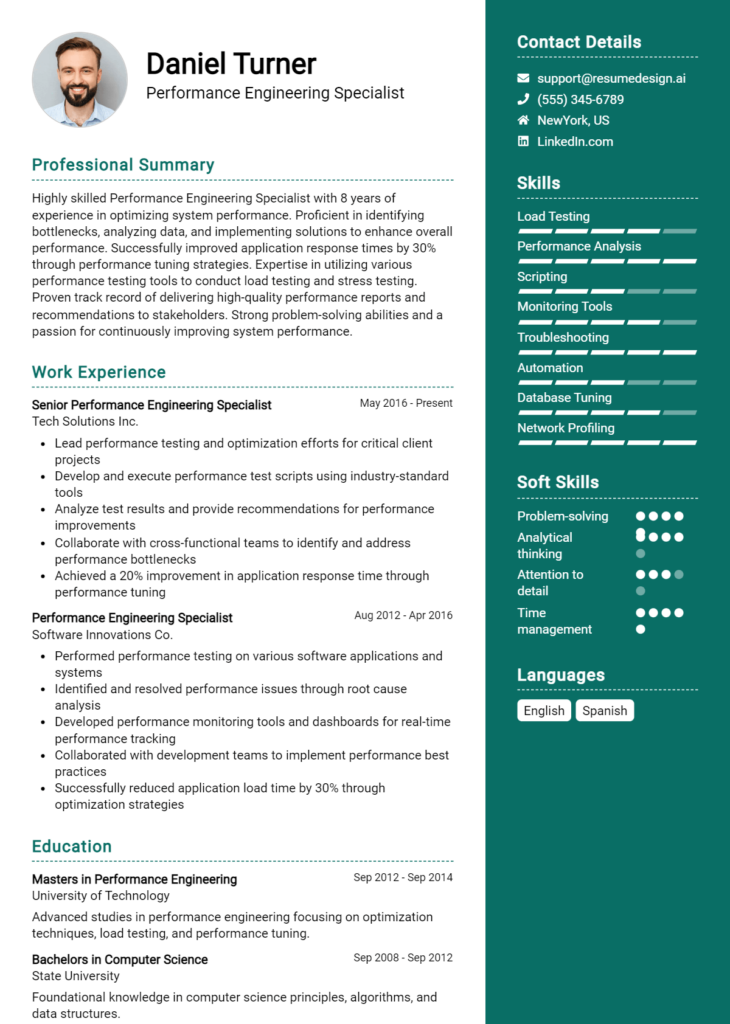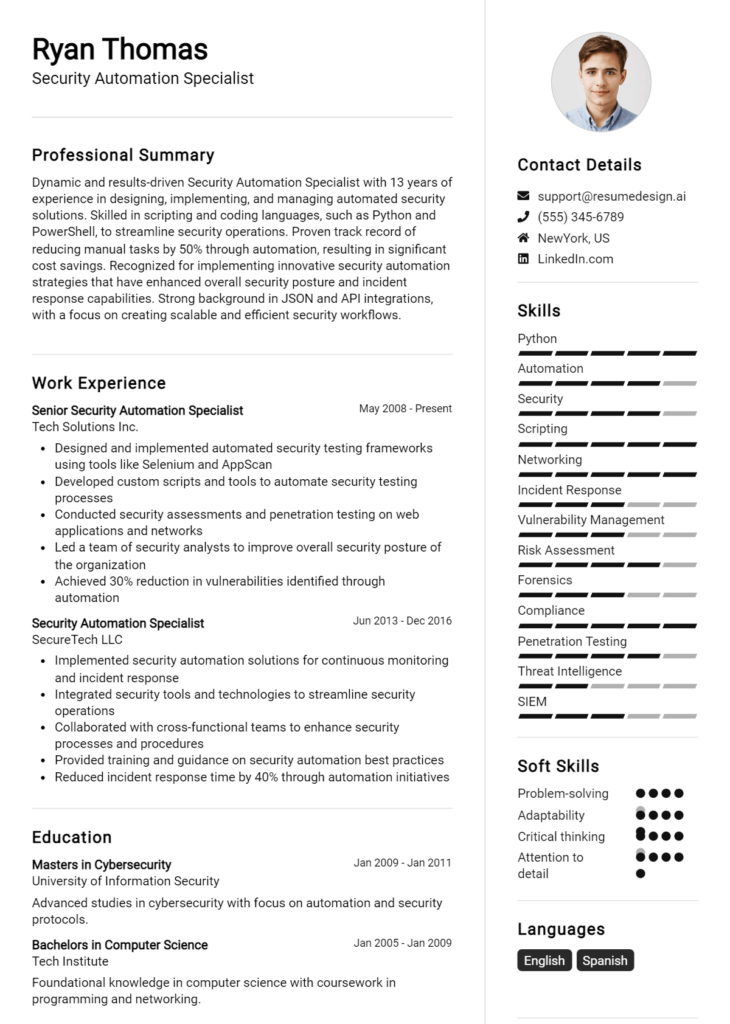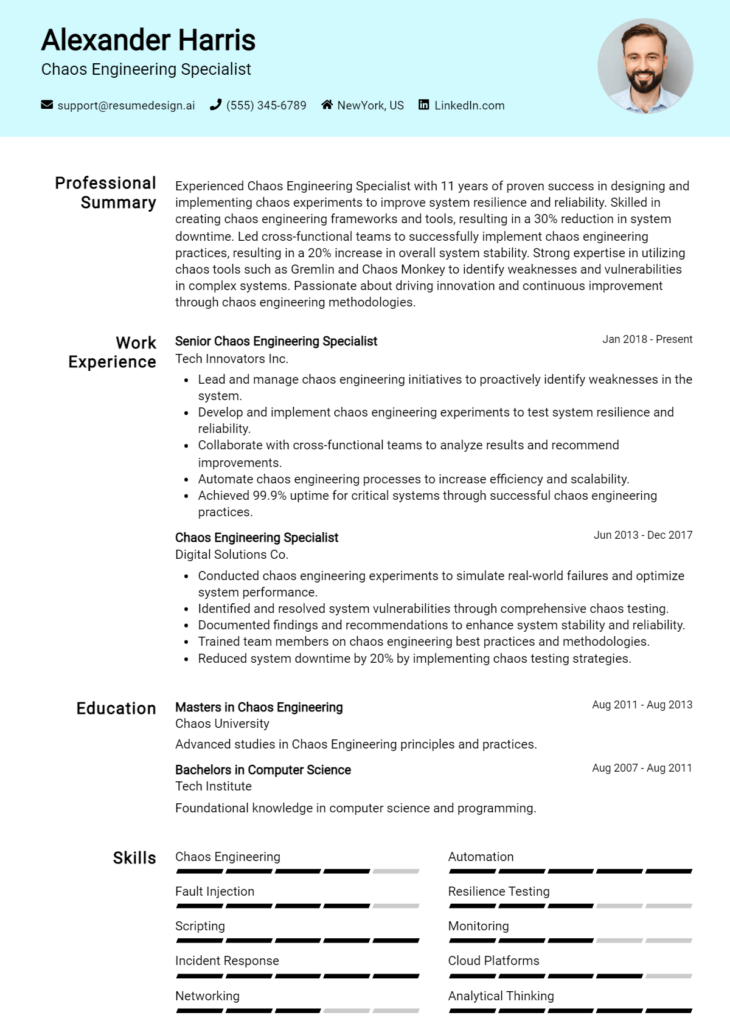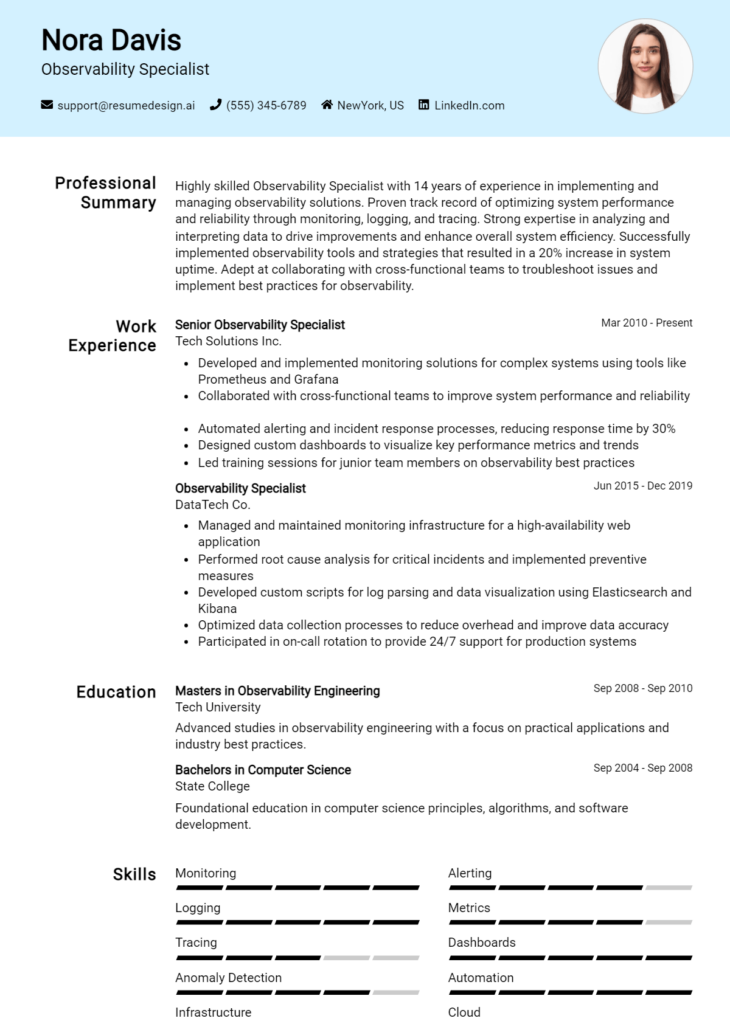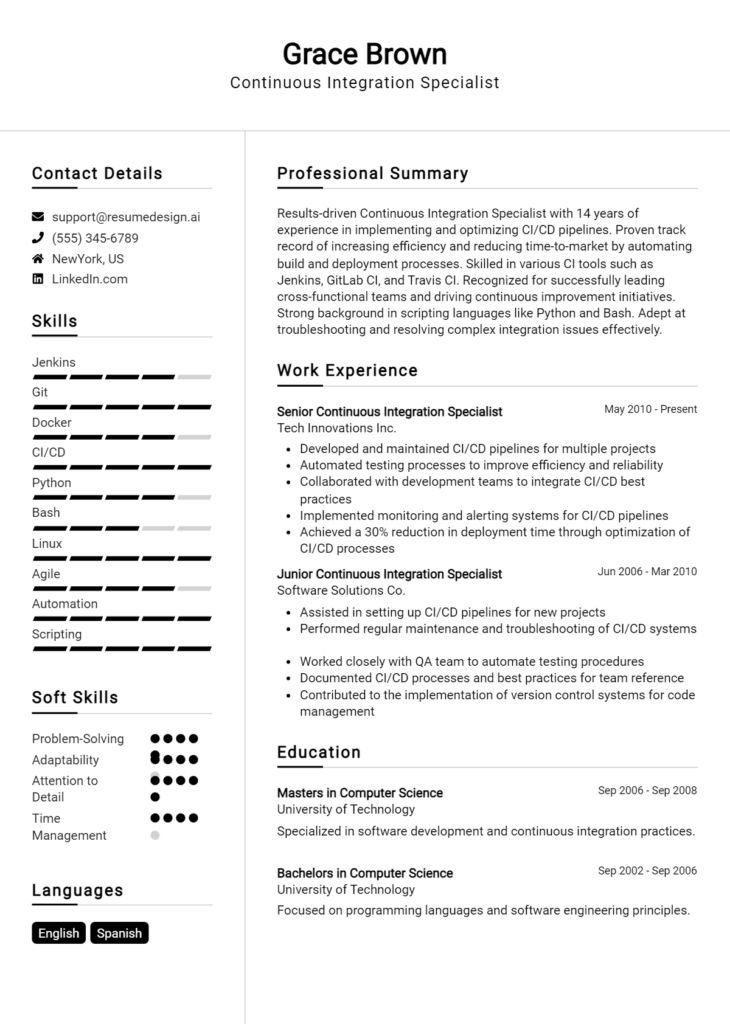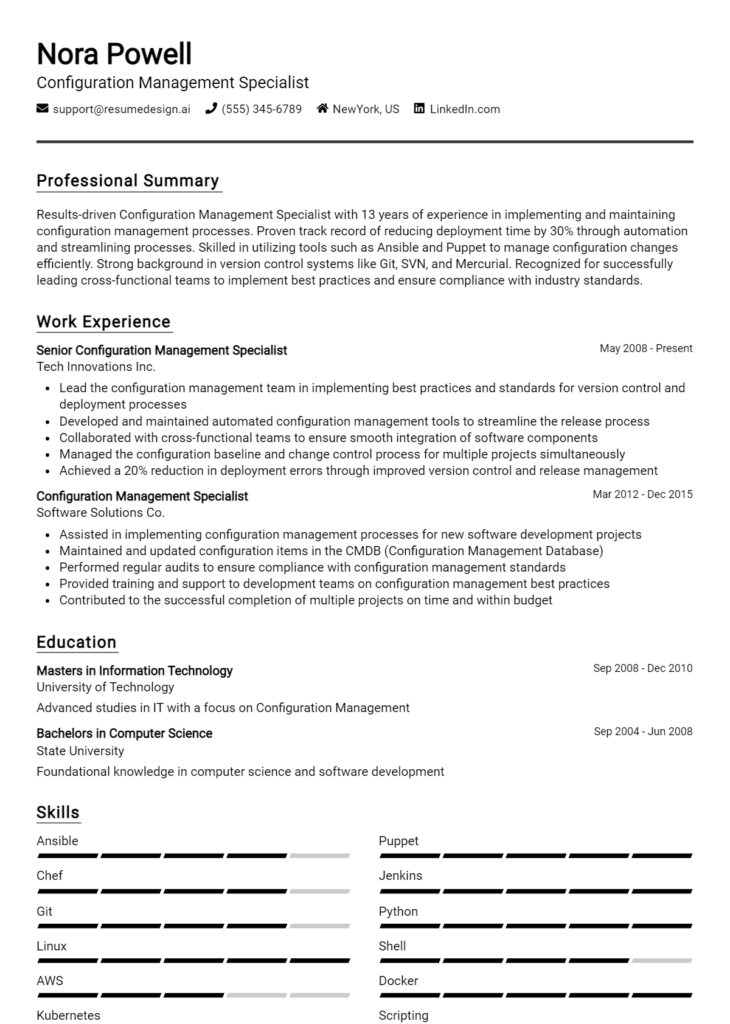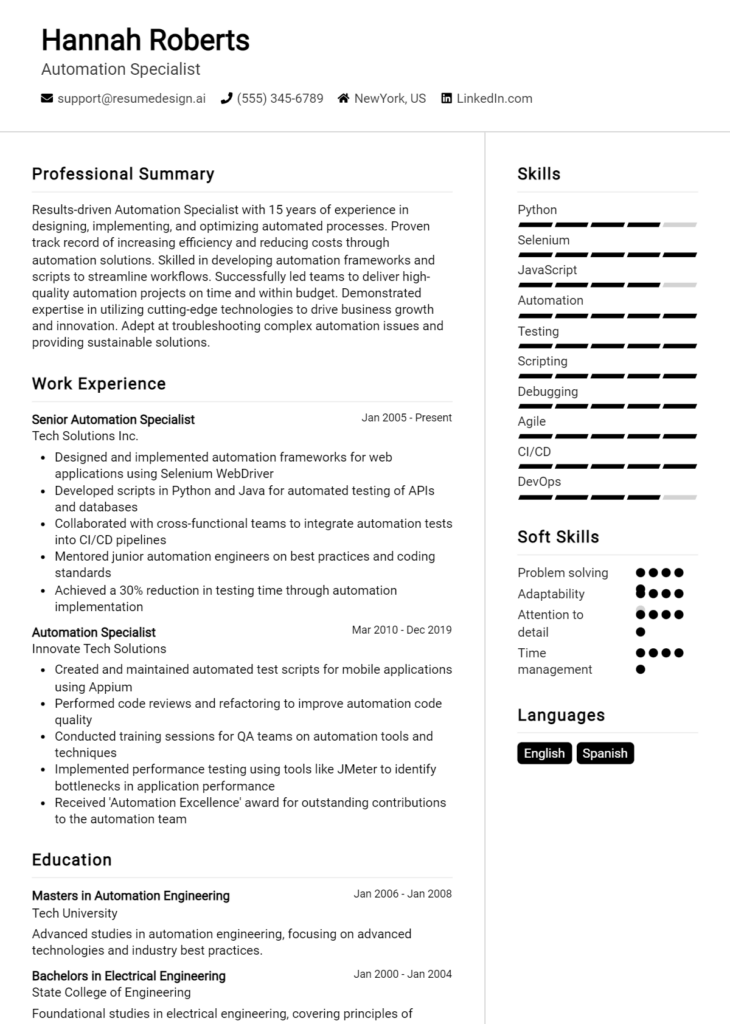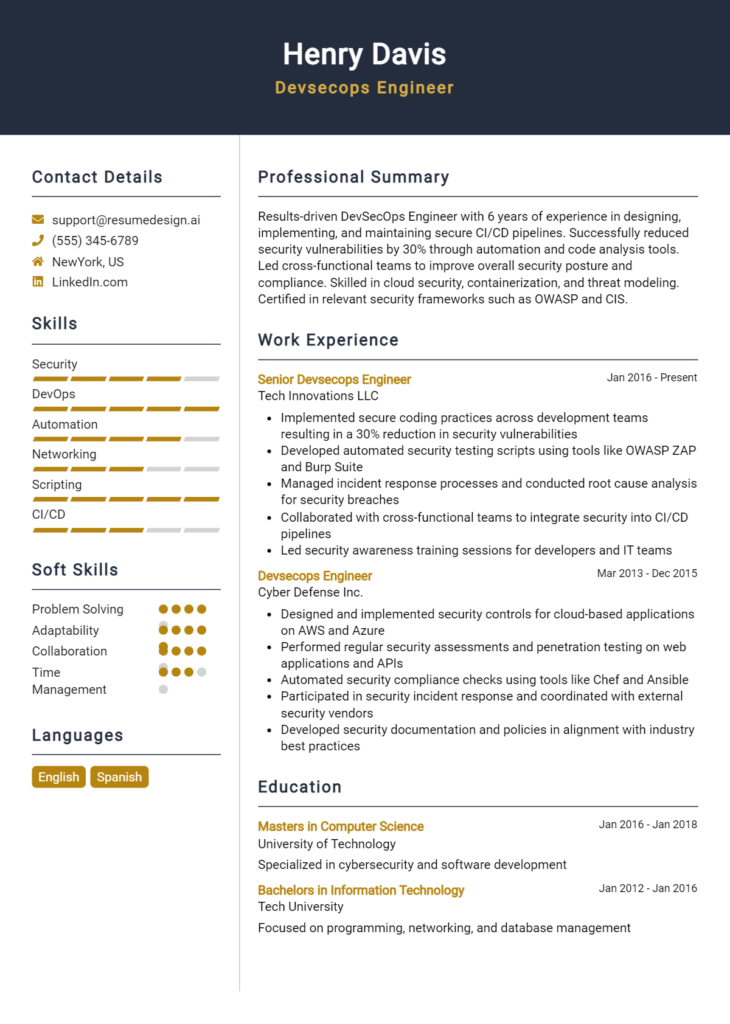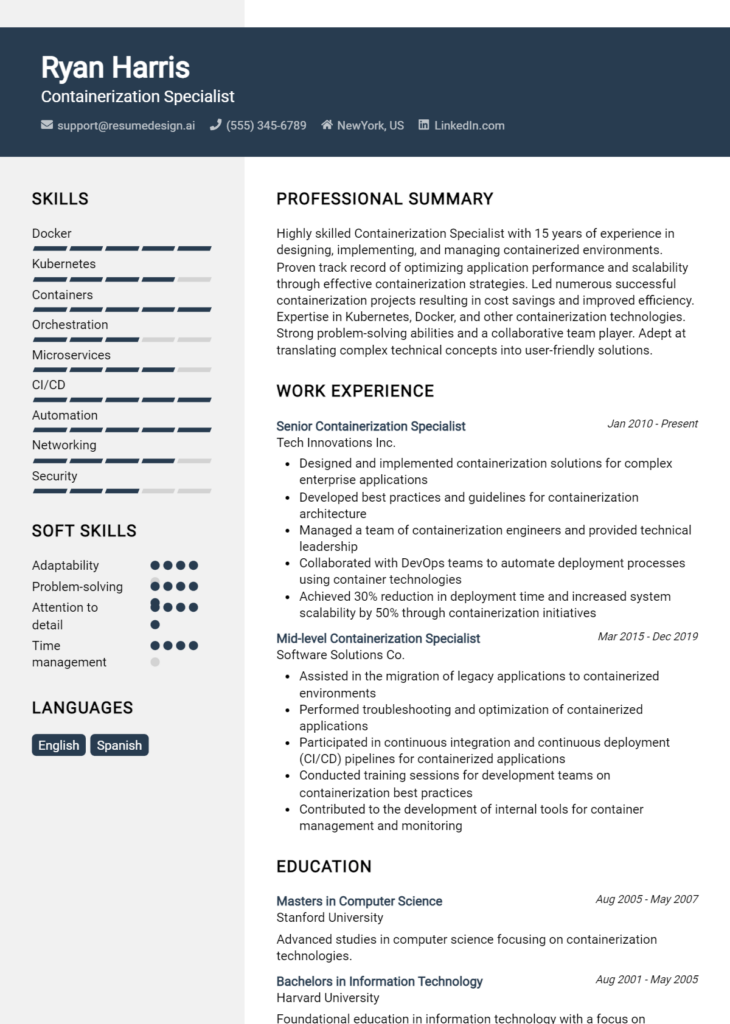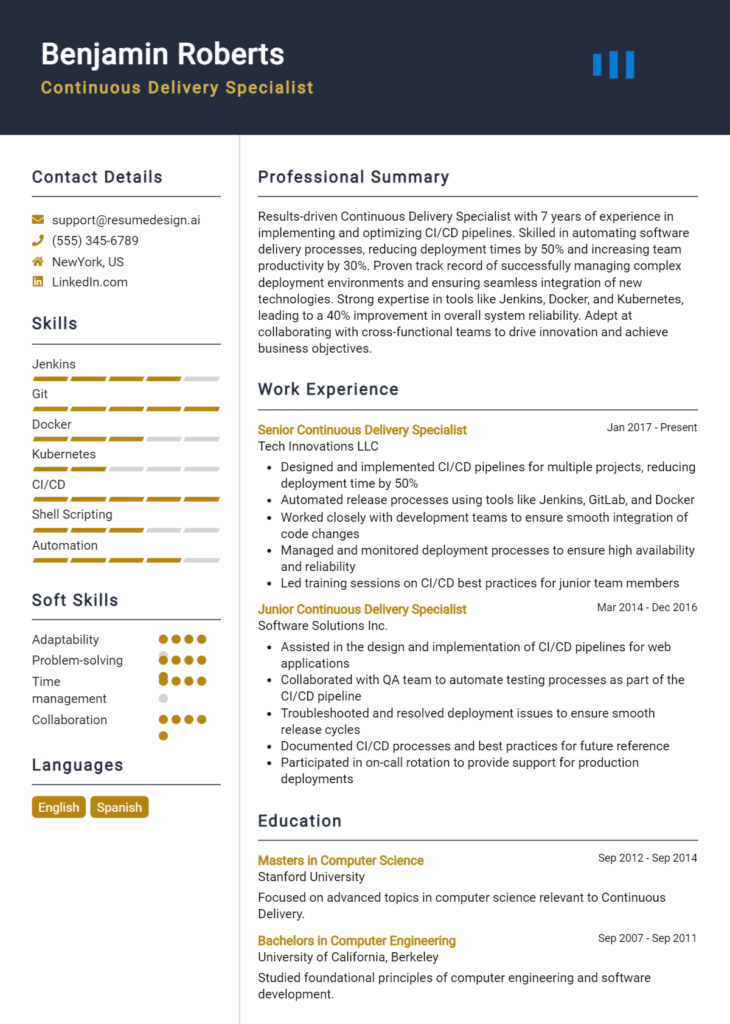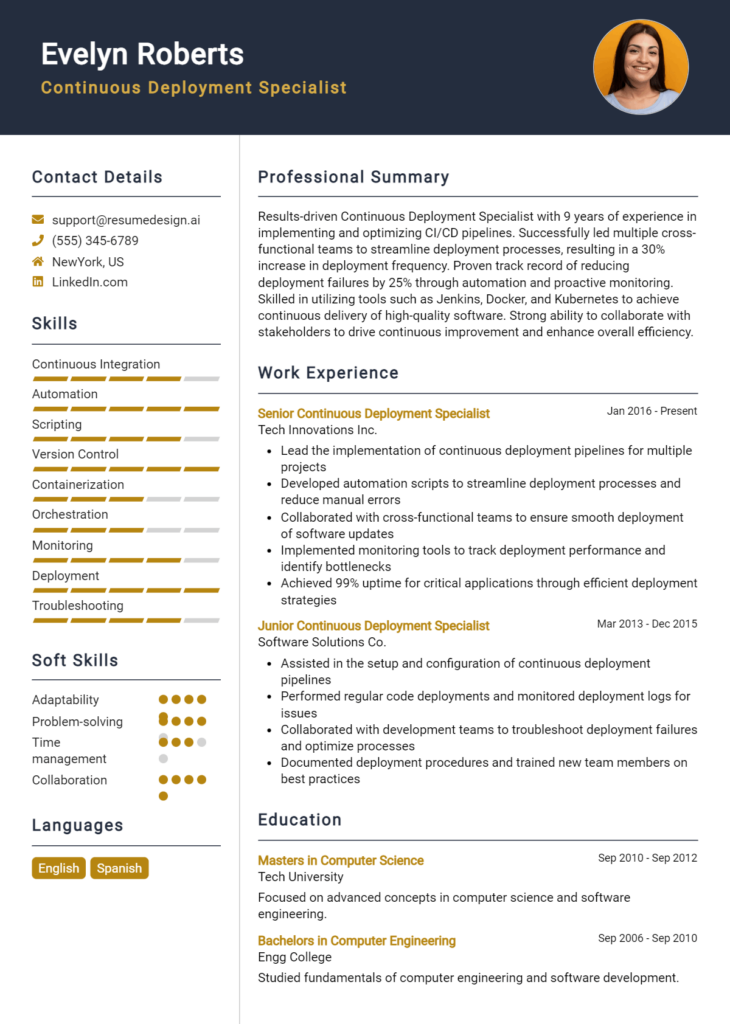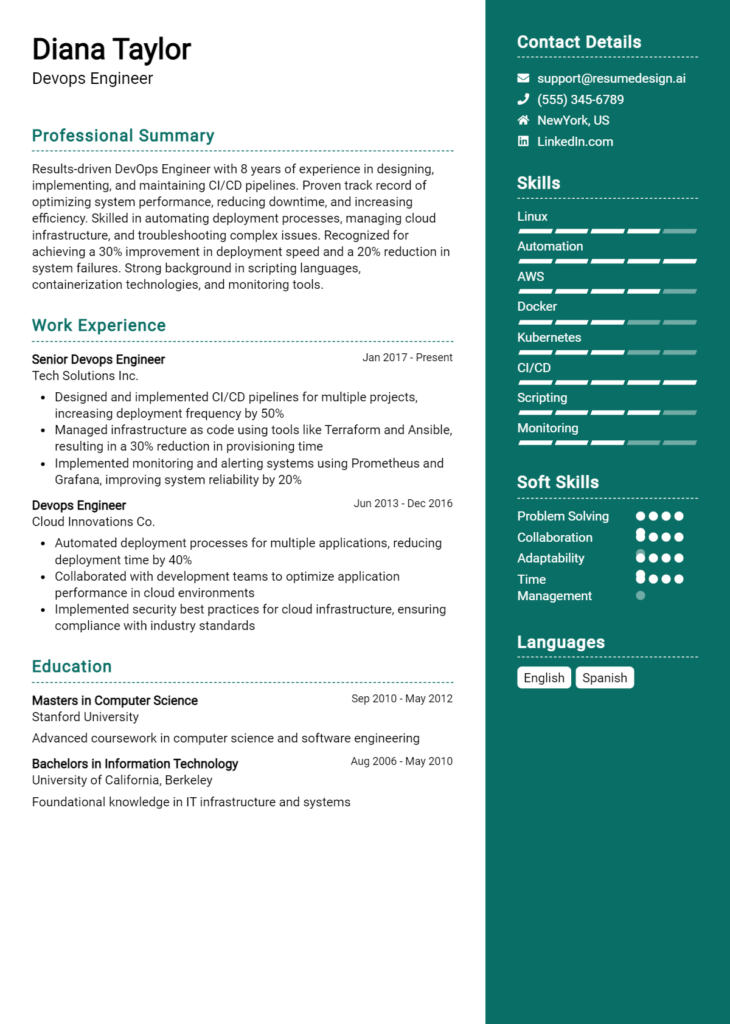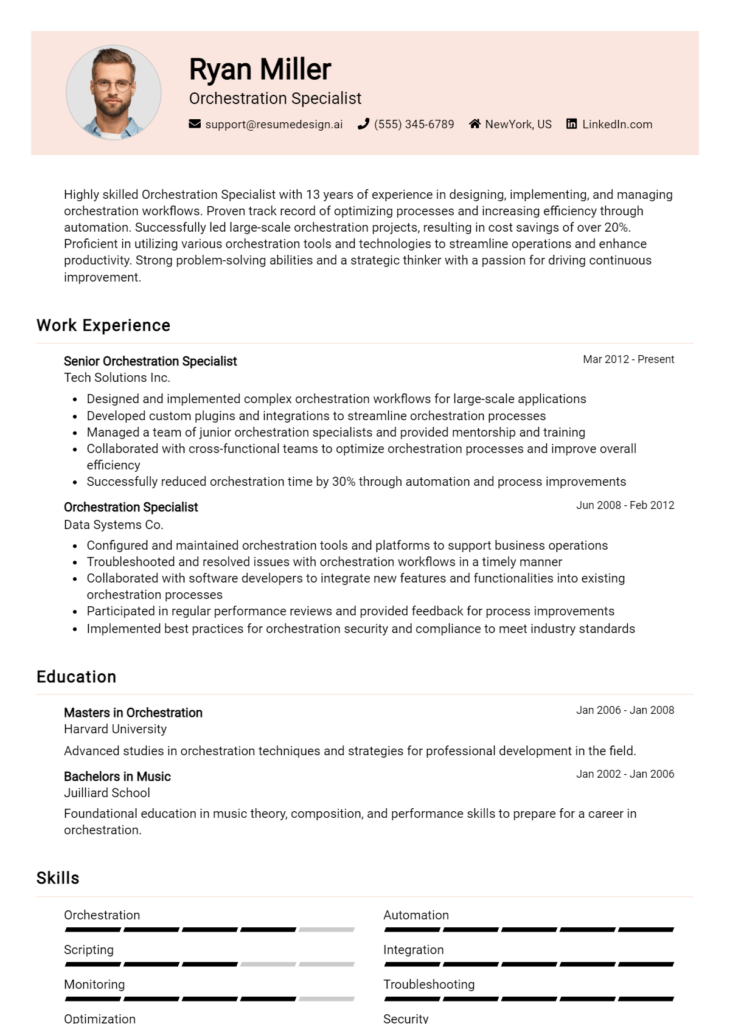Monitoring Specialist Core Responsibilities
A Monitoring Specialist plays a crucial role in ensuring operational efficiency and compliance across various departments. Key responsibilities include analyzing data trends, monitoring systems performance, and collaborating with IT and operational teams to troubleshoot issues. Essential skills encompass technical proficiency, operational insight, and adept problem-solving abilities. These competencies not only enhance departmental collaboration but also align with the organization's overarching goals. A well-structured resume showcasing these qualifications can significantly enhance a candidate's appeal to potential employers.
Common Responsibilities Listed on Monitoring Specialist Resume
- Conduct regular monitoring of systems and processes for performance evaluation.
- Analyze data to identify trends, anomalies, and potential issues.
- Collaborate with cross-functional teams to resolve operational challenges.
- Prepare detailed reports on monitoring findings and recommendations.
- Implement and maintain monitoring tools and technologies.
- Ensure compliance with industry regulations and internal policies.
- Provide technical support and training to team members.
- Develop and refine monitoring protocols and best practices.
- Facilitate communication between departments to enhance workflow.
- Respond promptly to alerts and escalate issues as necessary.
- Participate in the development of strategic plans to improve overall performance.
High-Level Resume Tips for Monitoring Specialist Professionals
In today's competitive job market, a well-crafted resume is crucial for Monitoring Specialist professionals looking to make a strong impression on potential employers. Your resume serves as your first introduction, and it needs to effectively showcase not just your skills but also your accomplishments in the field. A compelling resume can elevate your candidacy, demonstrating your understanding of monitoring systems, data analysis, and compliance standards. This guide will provide practical and actionable resume tips specifically tailored for Monitoring Specialist professionals, ensuring your application stands out in the recruitment process.
Top Resume Tips for Monitoring Specialist Professionals
- Tailor your resume to the specific job description by incorporating keywords and relevant phrases that match the requirements.
- Highlight your relevant experience in monitoring systems, including any specific tools or technologies you've worked with.
- Quantify your achievements with metrics, such as improvements in response times, reductions in errors, or enhancements in compliance rates.
- Showcase industry-specific skills, such as data analysis, risk assessment, and regulatory compliance knowledge.
- Include any certifications related to monitoring or quality assurance, as they can enhance your credibility.
- Use action verbs to describe your responsibilities and accomplishments, making your contributions clear and impactful.
- Maintain a clean and professional layout, utilizing clear headings and bullet points for easy readability.
- Incorporate a summary statement at the top of your resume that encapsulates your expertise and career goals in monitoring.
- List relevant training or professional development courses that demonstrate your commitment to staying current in the field.
- Consider adding a section for technical skills that lists specific software, tools, and methodologies you are proficient in.
By implementing these tips, Monitoring Specialist professionals can significantly increase their chances of landing a job in the field. A targeted and well-organized resume will not only highlight your qualifications but also demonstrate your commitment to the role, making a lasting impression on hiring managers.
Why Resume Headlines & Titles are Important for Monitoring Specialist
In the competitive field of monitoring specialists, where precision and analytical skills are paramount, a well-crafted resume headline or title plays a crucial role in making a strong first impression. These headlines serve as a powerful summary of a candidate's key qualifications, allowing hiring managers to quickly understand the applicant's value proposition. A strong headline should be concise, relevant, and directly related to the position being applied for, helping to capture attention and set the tone for the rest of the resume.
Best Practices for Crafting Resume Headlines for Monitoring Specialist
- Keep it concise: Aim for a headline that is brief yet informative, ideally one sentence.
- Be specific: Use industry-specific terminology and keywords relevant to the monitoring specialist role.
- Highlight key strengths: Focus on your most impressive skills or accomplishments that align with the job.
- Use action-oriented language: Start with strong verbs to convey your capabilities effectively.
- Tailor to the job: Customize your headline for each application to reflect the specific requirements of the role.
- Include relevant certifications: If applicable, mention any relevant certifications or qualifications that elevate your profile.
- Avoid clichés: Steer clear of overused phrases that may dilute your unique strengths.
- Consider your audience: Think about what hiring managers value most in a monitoring specialist and reflect that in your headline.
Example Resume Headlines for Monitoring Specialist
Strong Resume Headlines
Data-Driven Monitoring Specialist with 5+ Years of Experience in Network Security
Proficient Monitoring Specialist Skilled in Analyzing System Performance and Risk Management
Certified Monitoring Specialist with Expertise in Real-Time Data Analysis and Incident Response
Detail-Oriented Monitoring Specialist Committed to Enhancing Operational Efficiency and Compliance
Weak Resume Headlines
Monitoring Specialist Looking for a Job
Experienced Professional Seeking Opportunities in Monitoring
The strong headlines are effective because they immediately convey the candidate’s specific skills and experience, making them relevant to the job description. They utilize action-oriented language and industry terms that resonate with hiring managers. In contrast, the weak headlines fail to impress due to their vagueness and lack of specificity, leaving hiring managers with little insight into the candidate’s qualifications or unique strengths. By avoiding generic statements, candidates can better position themselves as valuable assets to potential employers.
Writing an Exceptional Monitoring Specialist Resume Summary
A well-crafted resume summary is essential for a Monitoring Specialist as it serves as the first impression a hiring manager gets of a candidate. This brief introduction quickly captures attention by showcasing key skills, relevant experience, and notable accomplishments tailored to the specific job role. An impactful summary not only highlights the candidate's qualifications but also sets the tone for the rest of the resume, making it crucial to present it in a concise and engaging manner. By carefully aligning the summary with the job description, candidates can effectively demonstrate their suitability for the position, increasing their chances of landing an interview.
Best Practices for Writing a Monitoring Specialist Resume Summary
- Quantify achievements: Use specific numbers to illustrate your impact, such as percentage improvements or successful project completions.
- Focus on relevant skills: Highlight technical skills and competencies that are directly applicable to monitoring tasks.
- Tailor the summary: Customize your summary for each job application to reflect the specific requirements and language of the job description.
- Use action verbs: Start sentences with strong action verbs to convey energy and confidence.
- Keep it concise: Aim for 2-4 sentences that deliver maximum impact without unnecessary fluff.
- Showcase industry knowledge: Mention any relevant certifications or industry standards that reinforce expertise in monitoring practices.
- Highlight soft skills: Include essential interpersonal skills, such as teamwork or communication, that complement the technical abilities.
- Avoid clichés: Steer clear of overused phrases that dilute the uniqueness of your summary and convey a lack of originality.
Example Monitoring Specialist Resume Summaries
Strong Resume Summaries
Results-driven Monitoring Specialist with over 5 years of experience in real-time data analysis and system performance optimization, achieving a 30% reduction in downtime for critical systems. Skilled in utilizing advanced monitoring tools and technologies to enhance operational efficiency and ensure compliance with industry standards.
Detail-oriented Monitoring Specialist with a proven track record of implementing proactive monitoring solutions, leading to a 25% increase in system reliability. Expertise in network performance monitoring and incident response, complemented by strong analytical skills and a commitment to continuous improvement.
Dynamic Monitoring Specialist possessing extensive experience in designing monitoring frameworks across diverse IT environments. Successfully spearheaded a project that improved system response times by 40%, while also mentoring junior team members on best practices in performance monitoring.
Weak Resume Summaries
Experienced Monitoring Specialist looking for a challenging role in a reputable company. I have skills in monitoring and analysis.
Dedicated professional with some experience in monitoring systems. I am a hard worker and eager to contribute to the team.
The examples of strong resume summaries effectively showcase quantifiable results, specific skills, and a direct relevance to the Monitoring Specialist role, giving hiring managers clear insight into the candidates' capabilities. In contrast, the weak summaries lack detail, fail to highlight measurable achievements, and come off as generic, making it difficult for recruiters to gauge the candidates' fit for the position. Strong summaries present a compelling narrative that positions the candidate as a valuable asset, while weak summaries do not effectively engage potential employers.
Education and Certifications Section for Monitoring Specialist Resume
The education and certifications section of a Monitoring Specialist resume plays a vital role in showcasing a candidate's academic achievements, relevant certifications, and commitment to continuous professional development. This section not only highlights the candidate's formal education but also emphasizes the industry-specific qualifications that are essential for excelling in monitoring roles. By providing details on relevant coursework, certifications, and specialized training, candidates can significantly enhance their credibility and demonstrate their alignment with the expectations of the job role, making them more appealing to potential employers.
Best Practices for Monitoring Specialist Education and Certifications
- Focus on relevance: Include degrees and certifications directly related to monitoring, data analysis, or specific industry tools.
- Be specific: Clearly state the degree earned, institution, and graduation date for each educational qualification.
- Highlight advanced certifications: Prioritize industry-recognized certifications that demonstrate specialized knowledge and skills.
- Include relevant coursework: List specific coursework that pertains to monitoring practices, data analysis, or risk management.
- Showcase continuous learning: Mention any ongoing education or training programs that reflect a commitment to staying updated in the field.
- Use clear formatting: Ensure the section is easy to read with consistent formatting for each entry, including bullet points and spacing.
- Prioritize recent qualifications: Lead with the most recent and relevant educational experiences to capture the hiring manager's attention.
- Consider professional development: Include workshops, seminars, or online courses that further enhance your qualifications.
Example Education and Certifications for Monitoring Specialist
Strong Examples
- Bachelor of Science in Information Technology, University of Technology, Graduated May 2022
- Certified Monitoring Specialist (CMS), International Association of Monitoring Professionals, Certified June 2023
- Data Analysis and Visualization, Coursera, Completed January 2023
- Master’s in Cybersecurity, National University, In Progress, Expected Graduation December 2024
Weak Examples
- Associate Degree in Fine Arts, Community College, Graduated June 2015
- Certification in Basic Computer Skills, Online Course, Completed December 2020
- High School Diploma, Anytown High School, Graduated May 2010
- Old Certification in Network Administration, Old Tech Institute, Certified December 2010
The strong examples provided are considered effective as they directly align with the qualifications needed for a Monitoring Specialist role, showcasing relevant degrees and current certifications. They demonstrate a commitment to the field through ongoing education and recognized credentials. In contrast, the weak examples lack relevance to the monitoring profession, showcasing outdated qualifications and credentials that do not reflect the candidate's suitability for the role, thus diminishing their appeal to potential employers.
Top Skills & Keywords for Monitoring Specialist Resume
When crafting a resume for a Monitoring Specialist position, showcasing the right skills is crucial for standing out in a competitive job market. Employers look for candidates who not only possess technical expertise but also demonstrate strong interpersonal abilities. Highlighting relevant skills can effectively communicate your qualifications and fit for the role, making it easier for hiring managers to see your potential contributions. A well-structured resume that emphasizes both hard and soft skills will greatly enhance your chances of landing an interview and advancing your career.
Top Hard & Soft Skills for Monitoring Specialist
Soft Skills
- Attention to Detail
- Analytical Thinking
- Problem-Solving
- Effective Communication
- Team Collaboration
- Adaptability
- Time Management
- Critical Thinking
- Decision Making
- Customer Service Orientation
- Conflict Resolution
- Multi-tasking
- Empathy
- Organizational Skills
- Stress Management
- Active Listening
- Initiative
Hard Skills
- Network Monitoring Tools
- Data Analysis Software
- Incident Response Protocols
- Performance Metrics Tracking
- System Administration
- Knowledge of Monitoring Frameworks
- Security Compliance Standards
- Reporting and Documentation
- Troubleshooting Techniques
- Database Management
- Cloud Monitoring Solutions
- ITIL Framework Knowledge
- Scripting Languages (e.g., Python, Bash)
- Performance Tuning
- Familiarity with DevOps Practices
- Configuration Management
- Understanding of Network Protocols
By integrating these skills into your resume and emphasizing relevant work experience, you can create a compelling narrative that showcases your qualifications as a Monitoring Specialist.
Stand Out with a Winning Monitoring Specialist Cover Letter
I am writing to express my interest in the Monitoring Specialist position at [Company Name] as advertised on [where you found the job listing]. With my extensive background in data analysis, incident response, and system monitoring, I am excited about the opportunity to contribute to your team and ensure that [Company Name] maintains the highest standards of operational efficiency and security.
In my previous role at [Previous Company Name], I successfully managed various monitoring tools and platforms, enabling real-time analysis of system performance and security threats. My experience includes configuring and maintaining monitoring solutions, generating detailed reports, and implementing proactive measures to mitigate potential risks. I take pride in my ability to identify trends and anomalies, which has led to a 30% reduction in incident response time over the past year. I am particularly drawn to the collaborative environment at [Company Name], where I believe my skills in cross-departmental communication and teamwork will thrive.
I am also highly adaptable and committed to continuous learning, which I believe is essential in the rapidly evolving field of monitoring and cybersecurity. I have recently completed certifications in [specific certifications relevant to monitoring], which have equipped me with the latest methodologies and tools in the industry. I am eager to bring this knowledge to [Company Name] and contribute to innovative monitoring strategies that drive success and safeguard your operations.
Thank you for considering my application for the Monitoring Specialist position. I am looking forward to the opportunity to discuss how my skills and experiences align with the goals of [Company Name]. I am excited about the prospect of joining your team and contributing to the continued success and integrity of your monitoring systems.
Common Mistakes to Avoid in a Monitoring Specialist Resume
When crafting a resume for a Monitoring Specialist position, it's crucial to present your skills and experiences in a clear and effective manner. However, many candidates make common mistakes that can undermine their chances of standing out in a competitive job market. Avoiding these pitfalls can significantly enhance the quality of your resume and increase your chances of landing an interview. Here are some common mistakes to watch out for:
Using a Generic Template: Relying on a one-size-fits-all resume format can make your application seem impersonal. Tailor your resume to the specific job by highlighting relevant skills and experiences.
Neglecting Relevant Skills: Failing to showcase key monitoring tools and technologies relevant to the role can lead to missed opportunities. Ensure that you list skills such as data analysis, alert systems, and incident response.
Overloading with Jargon: While it's important to demonstrate your expertise, bombarding your resume with technical jargon can alienate hiring managers. Use clear and concise language to explain your experiences.
Omitting Quantifiable Achievements: Resumes that lack measurable accomplishments may not effectively convey your impact. Include specific metrics, such as improved system uptime or reduced response times, to illustrate your contributions.
Ignoring Keywords: Many organizations use applicant tracking systems (ATS) to filter resumes. Not including relevant keywords from the job description can result in your resume being overlooked.
Listing Responsibilities Instead of Achievements: Simply listing job duties can make your resume blend in with others. Focus on what you achieved in each role and how you added value to your previous employers.
Inconsistent Formatting: A resume with inconsistent fonts, bullet styles, or spacing can appear unprofessional. Maintain a clean and uniform format throughout to enhance readability.
Failing to Proofread: Spelling and grammatical errors can create a negative impression. Always proofread your resume multiple times or have someone else review it to ensure it is error-free.
Conclusion
As a Monitoring Specialist, your role is critical in ensuring systems and processes are functioning effectively. You are responsible for overseeing the performance of various systems, analyzing data, and implementing improvements. Key skills for this position include analytical thinking, attention to detail, and proficiency with monitoring tools. It’s also essential to possess strong communication skills, as you will often work with different teams to address issues and optimize performance.
In this article, we discussed the importance of tailoring your resume to highlight your unique skills and experiences relevant to the Monitoring Specialist role. Ensure that your resume reflects your technical expertise, successful projects, and any certifications that strengthen your candidacy.
Now is the perfect time to review and enhance your Monitoring Specialist resume. To assist you in this process, consider utilizing available resources such as resume templates, which can provide a solid foundation for your document. You may also want to explore the resume builder for an easy way to customize your resume according to your needs. Additionally, reviewing resume examples can inspire you with ideas on how to effectively showcase your experience. Don’t forget to create a compelling introduction with our cover letter templates, ensuring you make a strong impression from the start.
Take action now and elevate your resume to stand out in your job search as a Monitoring Specialist!

